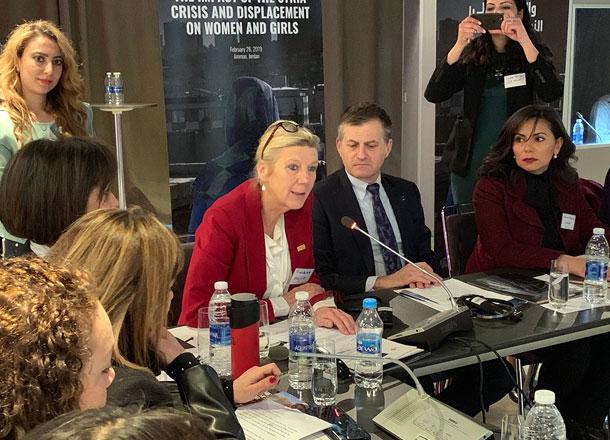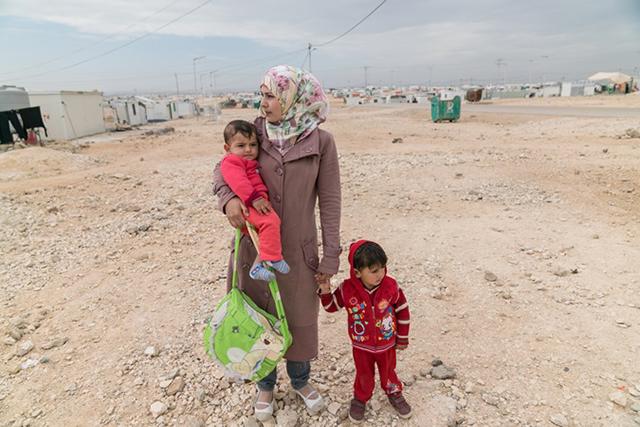You are here
Jordan, int’l community advocate for continued support ahead of conference on Syria
By Rana Husseini - Feb 26,2019 - Last updated at Feb 26,2019

Representatives of the EU, UN, local and international organisations and the Jordanian government on Tuesday attend a preparatory meeting for the upcoming Brussels conference on the Syrian crisis (Petra photo)
AMMAN — The international community, the Jordanian government and local organisations on Tuesday delivered their message to the third Brussels conference scheduled for next month: Continue supporting entities dealing with the Syrian refugee crisis, mainly women and girls.
Supporting women and girl refugees within host countries is an important priority because they are the most vulnerable and the most subjected to gender-based violence and trauma, a representative of the international and local community said.
The message was delivered during the “High-level discussion on the impact of the Syrian crisis on women and girls in Syria and countries hosting Syrian refugees”, held by the UNFPA, UN Women and the EU ahead of the Brussels conference next month.
EU Ambassador to Jordan Andrea Matteo Fontana said the EU firmly believes that women and girls, but also men and boys, should stand up to promote gender equality and women’s participation in public life.
“All around the world, but particularly in the Middle East, armed conflicts and regional crises continue, and unfortunately women and girls are the first to be impacted. This is why the EU supports national efforts in promoting the role of women in peace and security,” Fontana said.
Fontana added that the EU remained committed to supporting community resilience in Jordan, and would continue supporting their needs.
“Women are the bearers of peace, and their contribution to peace processes is often the most important one as they bring to the negotiation table a human perspective; the compassion and empathy of those who struggle every day for their families and children,” Fontana said.
The aim of the joint meeting included influencing the discussions and outcome of the conference to ensure concrete commitments to women’s rights and gender equality and to ensure women’s roles are highlighted.
The meeting also aimed at highlighting the role and needs of adolescent girls and youth in Syria, and the region.
As the third Brussels Conference on Supporting the Future of Syria and the Region is set to take place in March, according to an EU statement that was provided to the press, it is imperative for the international community to take stock of the progress made for commitments towards meeting the needs of Syrian women and girls, and safeguard their lives and dignity until a political solution restores peace and security in the country.
The commitments made at the conference must provide a cohesive vision for preventing and responding to gender-based violence, in addition to empowering Syrian women and increasing their resilience by helping them access viable livelihood opportunities, the EU statement said.
Also addressing the gathering was UN Women Representative Dina Zorba, who pointed to a recent study by UN Women on what it means to be a Syrian female refugee, eight years on.
“We recently asked over 1,000 Syrian women across the Middle East this question. Their answers... painted a picture of economic insecurity, uncertain civil status, limited work opportunities, isolation and increasing levels of gender-based violence,” Zorba explained.
The war and displacement have also shaken up traditional conceptions of gender norms and women’s roles, Zorba added.
“The majority of women we interviewed said they have had greater responsibilities at home and in their communities since the start of the crisis. For many, this also means having more say on family matters, becoming more visible in their communities and, for some, starting to work for the first time,” according to Zorba.
She also highlighted the plight of Syrian women when it came to taking part in the labour market.
“Only 1 per cent of the female Syrian refugees we spoke to in Lebanon had a work permit, while 13 per cent are currently working,” Zorba said, adding that “78 per cent of the women in Iraq were entitled to legal employment, [but] only 4 per cent managed to find any type of work”.
In Jordan, women have received 4 per cent of the work permits issued to refugees, Zorba stated.
Samar Mohareb, co-founder of Arab Renaissance for Democracy and Development, shared her organisation’s experience saying that the biggest challenge Syrian refugee women faced was a shift in gender roles.
“Syrian women are now the ones bringing bread to the table in addition to their other household duties and caring for their children. We need to keep this change in gender role in mind,” Muhareb said.
Muhareb added that it was also necessary to start planning for the future, “since not all Syrian refugees will return to their country and many will stay here”.
“We need the right technical support in addition to financial support to understand and analyse the situation of the Syrian refugees who will stay in Jordan,” Muhareb said.
Iraqi Ambassador to Jordan Safiah Suheil also addressed the event and stressed the need to highlight the success stories of women refugees.
“There are many women who were subjected to all forms of abuse because of forced migration, but many managed to stand on their feet and make a difference for themselves and families,” Suheil said.
Meanwhile, German Ambassador to Jordan Birgitta Siefker-Eberle added that the international community needs to also focus on ensuring the education of Syrian refugee girls who are 14 and above.
“The percentage of Syrian girls who enrol in secondary education is less than 15 per cent, so we need to ensure that these girls continue their education,” the Germen ambassador stressed.
Related Articles
AMMAN — The legal aid organisation Arab Renaissance for Democracy and Development (ARDD) on Sunday presented its 16 Days of Activism campaig
AMMAN — Confronting the phenomenon of sexual harassment in Jordan is a matter of high priority which needs to be addressed on a national lev
AMMAN — The Government of Japan is partnering with the United Nations Entity for Gender Equality and Women’s Empowerment (UN Women) to incre












